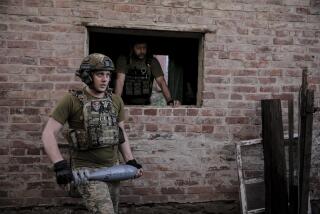Lower the Ante in the Gulf : Attack Has Shot Holes in a Policy We Don’t Need to Pursue
Six and a half years after it began, the Persian Gulf war has come home to the United States. Iraq’s attack on the American frigate, the Stark, appears to have been an accident, but it was no less deadly for that. It also shot holes in the Reagan Administration’s policy toward the region and the war.
Ever since the revelations about U.S. arms-for-hostages deals with Iran, the Administration has sought to reassure its moderate Arab friends that its trafficking with Ayatollah Ruhollah Khomeini was an aberration. Thus the United States has revived its “tilt” toward Iraq and placed on Iran the full burden for preventing a cease-fire and resolution of conflict.
Washington has tried to restore an arms embargo against Iran--but not Iraq. It has warned Iran about attacking oil tankers and pledged that it will keep open the Strait of Hormuz. It also is about to conclude an agreement with Kuwait, whereby 11 tankers will be transfered to U.S. registry and thereby to American protection.
The risks in this approach were revealed when the wrong side struck. It wasn’t supposed to happen this way and, indeed, Washington has been quick to dismiss anything other than pilot error on Iraq’s part. That is probably so. But the loss of life and the continuing danger argue for a new circumspection about getting ourselves involved “in harm’s way” in this conflict.
We should imagine what would now be happening if the culprit had been an Iranian aircraft. The President would be summoning his key advisers. The fleet would be racing toward the Persian Gulf. Politicians and pundits would be talking about the when and how of retaliation. And chances would be good that Reagan would order some form of military strike against Iran. In the process, eight years of U.S. popular frustration would be released.
Looking at events in this mirror image leads to a bigger question: What does the United States want in the Persian Gulf? The answer has been clear throughout the war. We want the war to end or, failing that, to be contained. We want to prevent the collapse of either Iraq or Iran. We want to keep the oil flowing. And we want to minimize opportunities for the Soviet Union to increase its influence in the region.
These objectives argue for keeping emotions under control in viewing the war. They argue for maintaining as neutral a position as possible. And they argue for keeping out of the line of fire, except when something important is at stake.
“Something important” does include keeping oil flowing, and Iran has attacked some tankers--though not any belonging to the United States. Yet Iraq began that tactic; it has been responsible for most attacks on shipping, and it makes no bones about trying to strangle Iran economically. Indeed, the odds for an accident have always favored Iraq as the source.
The attack on the Stark also raises doubts about the U.S. decision to “re-flag” some Kuwaiti tankers. It clearly is in the United States’ interest to deter Iranian attacks. Washington also wants to counter Soviet influence in Kuwait, which is growing because Moscow also has offered to protect Kuwaiti tankers. But Kuwait wants it both ways: to support Iraq in the war but not to be liable to Iranian retaliation.
The creeping exposure of U.S. ships and men also increases the chances that we will be drawn in through a different form of accident. Recently an Iranian vessel fired on a Soviet oil tanker. Yet by all accounts it was not the Iranian navy but the Revolutionary Guards, zealots pursuing their own interests and not necessarily those of strategists in Tehran. Should that happen to an American-registered vessel, what then? There is a haunting parallel to terrorist attacks against American citizens, where a military response could cause more damage than it provides relief.
The best authority for caution is Ronald Reagan himself. When he first spoke about the arms sales to Iran, he stressed Iran’s strategic importance and the compelling U.S. interest to contain Soviet influence. That interest continues; it would be damaged by U.S. military action against Iran, especially if that took place in response to actions that might be designed to drag the United States into the conflict. At some point we might have to use force against Iran, but not, surely, in response to an accident or provocation.
The tragedy of the Stark thus provides a chance to think again. There are proposals to provide fighter escorts for U.S. Navy vessels, and to send larger ships with more potent anti-aircraft systems. President Reagan has already changed the rules of engagement to permit more latitude in firing on potentially hostile aircraft. That’s a natural reaction.
Wisdom and prudence, however, call for lowering the ante, not raising it. If we want to help protect shipping in the Persian Gulf, it should be all shipping, not just that of one side, and we should have international help. For now, the Navy should keep its distance, and we should reserve the U.S. flag for our own ships. If we have to fight in the Persian Gulf, it should be for our interests, not someone else’s.
More to Read
Sign up for Essential California
The most important California stories and recommendations in your inbox every morning.
You may occasionally receive promotional content from the Los Angeles Times.










